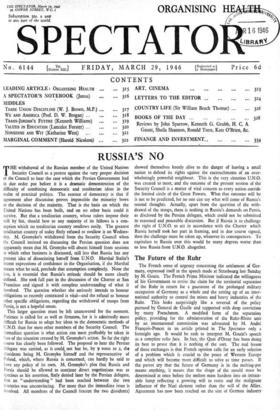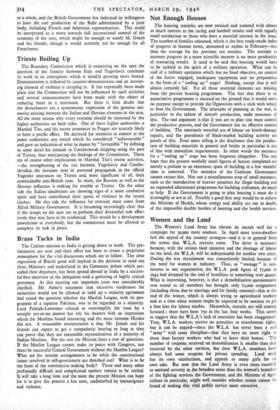The Future of the Ruhr
The French sense of urgency concerning the settlement of Ger- many, expressed itself m the speech made at Strasbourg last Sunday by M. Gouin. The French Prime Minister indicated the willingness of his Government to revise the claim for the territorial separation of the Ruhr in return for a guarantee of the prolonged military occupation of Germany as a whole and the setting up of an inter- national authority to control the mines and heavy industries of the Ruhr. This looks surprisingly like a reversal of the policy pursued by General de Gaulle and supported with deep conviction by many Frenchmen. A modified form of the separation policy, providing for the administration of the Ruhr-Rhine unit by an international commission was advocated by M. Andri Francois-Poncet in an article printed in The Spectator only a fortnight ago. It would be rash to interpret M. Gouin's speech as a complete volte face. In fact, the Quai d'Orsay has been doing its best to prove that it is nothing of the sort. The real lesson of these exchanges is that French opinion calls for an early solution of a problem which is crucial to the peace of Western Europe and which will become more difficult to solve as time passes. If the parrot cry that the future of Germany is in the melting-pot means anything, it means that the shape of the mould must be determined at once before the molten mass hardens into an intract- able lump reflecting a growing will to resist and the malignant influence of the Nazi element rather than the will of the Allies. Agreement has now been reached on the size of German industry
as a whole, and the British Government has indicated its willingness to have the coal production of the Ruhr administered by a joint body, including French and American representatives. This could be interpreted as a move towards full international control of the economy of the area, which might be enough to satisfy M. Gouin and his friends, though it would certainly not be enough for all Frenchmen.



























